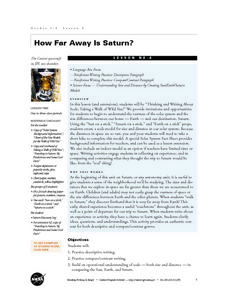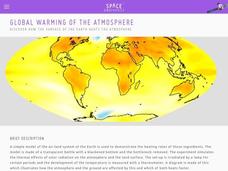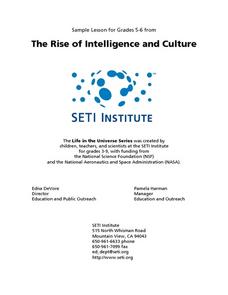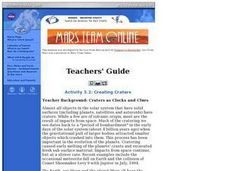Journey Through the Universe
Is There Anyone Out There?
What is an alien's favorite game? All-star baseball! Scholars start defining living and non-living. Then, they conduct experiments to research if life exists, keeping in mind that life could be in many forms, not just human.
California Academy of Science
Kinesthetic Astronomy: Earth's Rotation
After completing the activity, "Kinesthetic Astronomy: The Meaning of a Year," zoom in on Earth's rotation using the same simulation setup and this outline. Each class member dons a map of the Western Hemisphere and plays the part of...
Curated OER
Changing Faces: A Study of Solar and Planetary Rotation Rates
Students determine rotation rates of a variety of solar system objects using images and the Internet.
Journey Through the Universe
How Far is Far?
The earth only revolves around one thing — and it's not any of your pupils. The lesson includes two activities dealing with the distance to the sun and the moon. First, scholars create a pin hole camera and use the rules of similar...
Curated OER
Exploring Meteorite Mysteries: Building Blocks of Planets
Students simulate the formation of chondrites and asteroids. In this astronomy lesson, students demonstrate accretion using balloons and static electricity. They compare and contrast their models to the actual process of chondrites and...
Curated OER
The Climate Change Skeptic's Argument: Natural Solar Cycles or Human Activity?
Teachers explore patterns in sunspots and total solar irradiance to understand the counterpoint to the human effect of global warming. In this professional development tool, teachers work through a lesson on the sun's natural...
Curated OER
Understanding the Rutherford Model
In this Rutherford model worksheet, learners read about Rutherford's experiment with gold foil and alpha particles which led to the discovery of subatomic particles. Students answer six analysis questions about the experiment and...
Curated OER
How Far Away Is Saturn?
Students work together to create a scale model of the solar system. They write a descriptive paper and a paper comparing and contrasting the Earth to Saturn. They discuss their writings with the class.
Curated OER
Scientific Notation
Learners explore the concept of expressing numbers in scientific notation. In this scientific notation instructional activity, students understand the importance of using scientific notation by finding real world examples where...
Curated OER
Scale Basketball
Students understand that a spreadsheet can be used to find the best scale to use in a model. They place the distances of the planets of the solar system to the Sun in one column of the spreadsheet. Students try different scales so that...
Curated OER
Sweet Candy Comets
Fourth graders use candy to make a comet. In this instructional activity, 4th graders examine the role comets have played throughout history, students watch NASA videos about comets and complete the instructional activity by making an...
Space Awareness
Global Warming of the Atmosphere
Scientists know the amount of carbon dioxide in the atmosphere today is higher than at any point in the last 800,000 years. Scholars learn about the amount of thermic radiation absorbed by air and what happens to the rest of the...
Curated OER
Specializing in Space
In this literature book review activity, young scholars read a nonfiction book about space or space exploration before choosing a topic to explore further. They choose from 7 activities such as designing a model, writing a letter, write...
Curated OER
The Earth, Sun Mood and Stars Unit (Planets too!)
Fifth graders prepare five activities to do then show their energy saving skills. In this investigative lesson plan students create five projects then participate in an energy saving demonstration.
Curated OER
A View Of Home From The Front Door and From Space
Students discover how distance can change how our view of an object. Students build a representative model of where their home is located from different distances. They create three drawn models of their home from various elevations as...
Curated OER
Extraterrestrial Communication: Can We Talk to Anybody Out There?
Learners examine the possibilities of communication with other living organisms within our solar system through research and hands on activities, as well as observing and analyzing teacher demonstrations.
University of Connecticut
Building Your Own Biosphere
On September 26, 1991, four women and four men entered the scientific experiment, Biosphere 2; the doors were sealed for two years in order to study the interactions of a biosphere. In the activity, scholars explore biospheres by...
Curated OER
It's A Meteor
Students complete a webquest to find Earth's relationship to the sun. In this webquest instructional activity, students complete tasks to understand the effect of the sun on weather and time. Students create a multimedia...
Curated OER
Wow, Saturn Is Much Bigger Than Earth!
Young scholars compare and contrast the sizes of Earth and Saturn. They create scale illustrations of each planet and label them. They share their models with the class.
Curated OER
Creating Craters
Learners explore parts of an impact crater and compare and contrast craters found in Earth, the Moon, and Mars. Crater formation is modelled and the relationship of mass, velocity, and size of the projectile to the crater formation is...
Curated OER
Earth, Moon, Mars Balloons
Students demonstrate size and orbits of Earth, Moon, and Mars. In this space science lesson plan, students will use balloons to show how the size and distance between the planets and satellite compare.
Curated OER
Summarize This!
Students explore how to summarize a reading passage. They read non-fiction books. Students use a Venn Diagram to compare and contrast the two animals they read about. They write a summary using the information in their Venn Diagram.
Curated OER
Ellipse
Students explore the concept of ellipses including finding the center, vertices's, foci and eccentricity. They assess how to graph elliptical functions and solve application problems involving ellipses. This assignment is to be completed...
Curated OER
Biospheres
Second graders create models, practice inquiry skills, work with fellow students in teams, and reinforce concepts discussed in class all by using the theme of BIOSPHERES.























